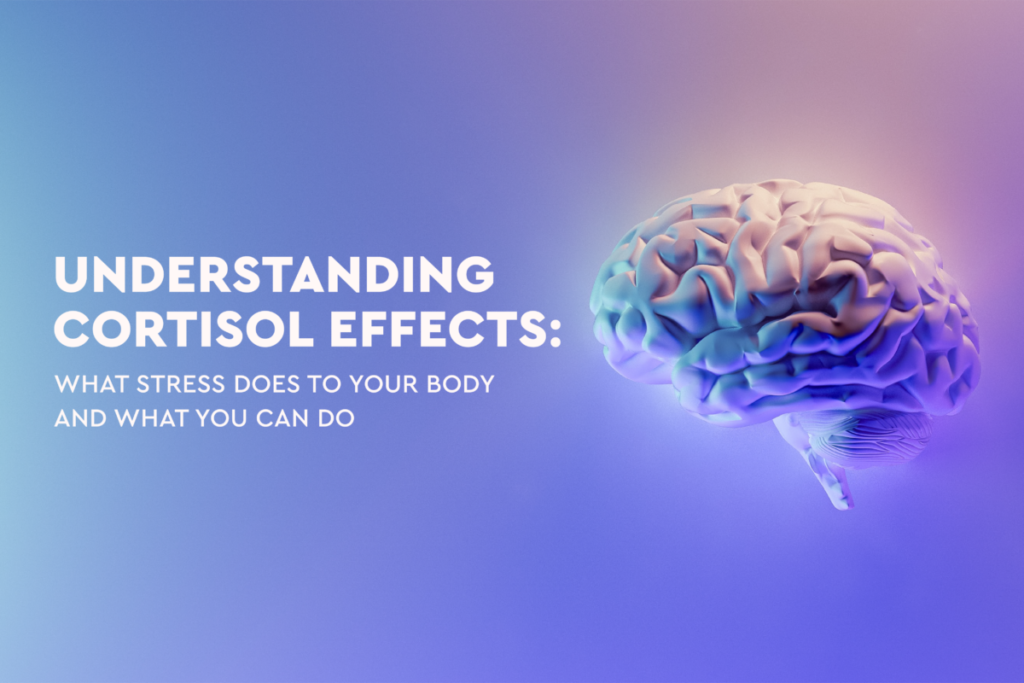Now most people are aware that stress triggers the release of cortisol, a hormone produced by the adrenal glands. Cortisol is often referred to as the “stress hormone” because its levels increase during times of stress. So, what does it exactly do to our bodies? Also, what can we actually do to manage our stress better?
Energy metabolism: Cortisol helps regulate energy metabolism by increasing the production of glucose (sugar) in the liver. This provides the body with a quick source of energy to cope with the stressor. However, prolonged cortisol release due to chronic stress can lead to increased blood sugar levels and potentially contribute to the development of conditions like type 2 diabetes.
Immune system: While short-term cortisol release can have anti-inflammatory effects, long-term elevation of cortisol can suppress the immune system. This makes individuals more susceptible to infections and slows down the healing process.
Cardiovascular system: Cortisol increases heart rate and blood pressure, preparing the body for a “fight or flight” response. While this response is helpful in short bursts, chronic cortisol elevation can contribute to hypertension (high blood pressure) and increase the risk of cardiovascular diseases.
Digestive system: Cortisol inhibits digestive processes and can lead to decreased appetite and slowed digestion. Additionally, it can increase the storage of fat in the abdominal area, which is associated with an increased risk of cardiovascular problems and metabolic disorders.
Brain function: Cortisol affects the brain by influencing mood, motivation, and memory. Excessive cortisol levels can contribute to anxiety, depression, and impaired cognitive function.
Then, what can we actually do to help reduce stress levels and mitigate the negative impact of cortisol on the body?
Dealing with stress in a healthy manner is crucial for maintaining overall well-being.
Meditation: Practice relaxation techniques:
Techniques like deep breathing exercises, meditation, progressive muscle relaxation, and mindfulness can help calm the mind and body. These practices promote relaxation, reduce stress hormones, and increase overall feelings of calmness. Just like whether you like it or not, your body needs exercise to maintain physical health and strength, and in the same manner, the mind also needs meditation to maintain mental health and a positive mindset!
Prioritize self-care:
Take time for yourself and engage in activities you enjoy. This could include hobbies, reading, taking a bath, listening to music, or spending time with loved ones. Setting aside regular time for self-care helps recharge your mental and emotional batteries.
Maintain a balanced lifestyle: Strive for a healthy work-life balance. Set boundaries, delegate tasks when possible, and learn to say no when you feel overwhelmed. Ensure you’re getting enough sleep, eating nutritious meals, and practicing good time management to avoid unnecessary stressors.
Seek social support: Connect with friends, family, or a support network. Sharing your feelings and concerns with others can provide emotional support and perspective. Having someone to listen, offer advice, or simply be there for you can be incredibly beneficial in managing stress.
Manage your time effectively: Prioritize tasks, break them into smaller, manageable steps, and create a schedule or to-do list. This helps reduce feelings of being overwhelmed and increases productivity, allowing you to approach tasks in a more organized manner.
Practice positive thinking: Challenge negative thoughts and replace them with positive and realistic ones. Focus on gratitude and maintaining a positive mindset. Engaging in activities like journaling, meditation or affirmations can help shift your perspective and reduce stress.
Seek professional help if needed: If stress becomes overwhelming or starts to significantly impact your daily functioning, don’t hesitate to seek support from a mental health professional. They can provide guidance, teach coping skills, and help you develop a personalized stress management plan.


